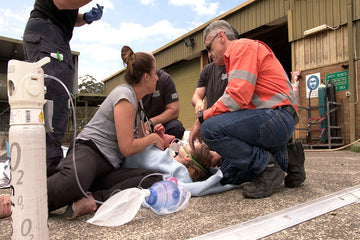Introduction
In today's busy office, making certain the Mental health first aid security and wellness of your workforce is vital. One element that frequently obtains forgotten is hand-operated handling, which describes the procedure of training, bring, pushing, or pulling items. In this short article, we will explore efficient hand-operated handling techniques that can assist maintain your labor force secure and healthy. We will certainly additionally review the value of emergency treatment training, including CPR training and mental health first aid, and how these components add to a safer job environment.
Manual Handling Methods: Maintaining Your Workforce Safe and Healthy
Manual handling strategies are vital for avoiding injuries in the work environment. Incorrect lifting techniques can cause bone and joint problems (MSDs), which account for a substantial variety of work environment injuries. To efficiently mitigate risks related to hands-on handling, companies need to apply training programs that highlight appropriate techniques.
Understanding Handbook Taking care of Risks
Before diving right into particular methods, it's vital to recognize the risks involved in hands-on handling jobs. According to research study, poor training techniques can lead to:
- Back pain Muscle strains Joint injuries Chronic problems influencing mobility
Recognizing these risks permits employers and workers alike to prioritize safety.
The Value of Training
Training plays an important role in minimizing manual handling-related injuries. It's not just about knowing exactly how to raise correctly; it's additionally regarding recognizing body auto mechanics and comfort designs. A comprehensive manual handling training training course should cover:
- Proper lifting techniques Risk assessment skills Use of tools like carts or forklifts
Additionally, including first help courses right into work environment training makes certain that everybody recognizes how to respond properly in case of an injury.
Basic Lifting Techniques
Here are some foundational methods that everybody need to grasp:
1. Assess the Load
- Before lifting anything, always assess its weight and shape. If it appears also heavy or awkwardly shaped, look for support or use mechanical aids.
2. Positioning
- Stand near to the object. Place your feet shoulder-width apart for balance. Bend your knees while maintaining your back straight.
3. Grip
- Ensure a company grip on the object. Use both hands when possible.
4. Lifting
- Lift with your legs as opposed to your back. Keep the item near to your body as you stand up.
5. Carrying
- Maintain a secure position while walking. Avoid twisting your body; rather, turn your whole body by moving your feet.
6. Setting Down
- Lower the things by flexing at the knees again. Ensure that you place it down delicately without going down it.
Using Tools for Hands-on Handling
Investing in tools created for hands-on handling can substantially minimize injury danger. Below's a list of typically used devices:

|Equipment Kind|Objective|| ----------------|--------------------------------------|| Trolleys|For delivering hefty things|| Hoists|For raising people or Visit the website hefty things|| Pallet Jacks|For moving palletized lots|
Incorporating Emergency treatment Training
While decreasing risks through correct hands-on handling is crucial, being prepared for emergency situations is equally crucial. This is where emergency treatment training comes into play.
Types of First Aid Courses Available
General Office First Aid
- Covers standard emergency treatment skills needed in different job environments.
CPR Training

- Teaches lifesaving cardiopulmonary resuscitation strategies essential throughout cardiac emergencies.
Corporate Emergency treatment Training

- Tailored programs specifically developed for company settings focusing on common work environment injuries.
Mental Wellness First Aid
- Provides abilities to aid coworkers battling with psychological health and wellness issues-- an essential part commonly ignored in traditional first aid courses.
Childcare Emergency treatment Course
- Focuses on responding to emergencies entailing youngsters-- ideal for those working in instructional setups or childcare centers.
Online Emergency treatment Course
- Offers versatility for staff members to learn at their own pace while still covering all essential content.
Creating a Culture of Safety
To keep a setting conducive to security, cultivating a culture where staff members feel encouraged to speak out regarding dangers is essential.
1. Encourage Open up Communication
Encourage staff members to report harmful problems without anxiety of retribution; this promotes an open discussion concerning prospective risks connected with hands-on handling tasks.
2. Regular Training Sessions
Hold regular workshops on hand-operated handling methods and refresher courses on first aid courses-- keeping abilities sharp makes sure preparedness throughout emergencies.
3. Promote Psychological Well-being
Since psychological wellness plays a key duty in total wellness, companies ought to promote mental health understanding together with physical safety measures.
FAQs
Q1: What are the indicators that I need hand-operated taking care of training?
A1: If staff members often raise hefty things or report discomfort after lifting tasks, it's time for thorough manual handling training sessions.
Q2: Exactly how usually ought to we perform emergency treatment training?
A2: Ideally, emergency treatment training should occur annually; however, more constant sessions might be advantageous based on work environment dangers or modifications in staff.
Q3: Can online programs be as reliable as classroom-based training?
A3: Yes! Online courses have become increasingly interactive and supply important resources-- simply ensure they fulfill certification requirements!
Q4: What kind of tools must our work environment invest in?
A4: Buy carts, raises, pallet jacks, and ergonomic furniture-- these tools help decrease injury from incorrect manual handling practices.
Conclusion
In final thought, grasping appropriate hands-on handling techniques is crucial for cultivating a risk-free and healthy workforce setting. By prioritizing detailed training-- including necessary subjects like first aid courses-- you encourage staff members with expertise essential for both avoidance and response during emergency situations like accidents related to messed up loads.
Remember: Security isn't just a policy; it's a culture built with constant effort from every individual within an organization!
By giving efficient guidebooks on these techniques while stressing continuous finding out via accreditations such as mouth-to-mouth resuscitation or Mental Health First Aid Courses-- companies can produce work environments where safety thrives!